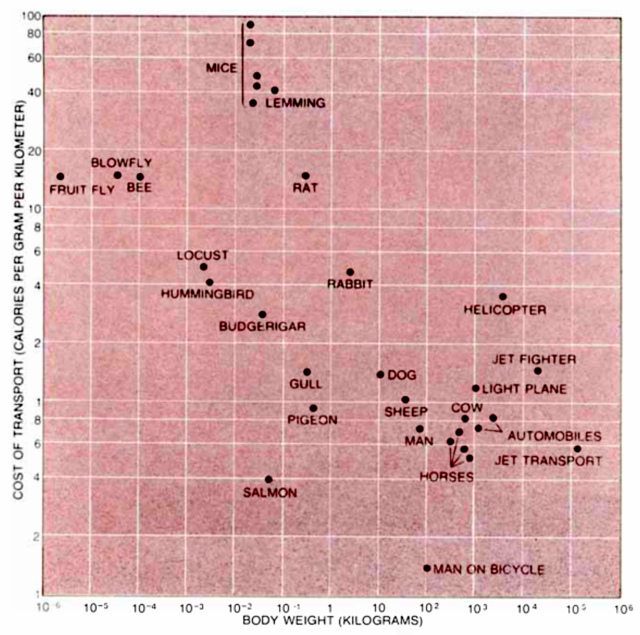
I think one of the things that really separates us from the high primates is that we're tool builders. I read a study that measured the efficiency of locomotion for various species on the planet. The condor used the least energy to move a kilometer. Humans came in with a rather unimpressive showing about a third of the way down the list. It was not too proud a showing for the crown of creation. So, that didn't look so good.
But then, somebody at Scientific American had the insight to test the efficiency of locomotion for a man on a bicycle. And, a man on a bicycle, a human on a bicycle, blew the condor away, completely off the top of the charts.
And that's what a computer is to me. What a computer is to me is it's the most remarkable tool that we've ever come up with.
It's the equivalent of a bicycle for our minds.
* * *
No one knows when or how we, the human species, started talking to each other. It is likely a natural progression from gesturing, but we can only speculate about it.
Language allowed us to break out of our brains and reveal the inner workings of our consciousness to others.
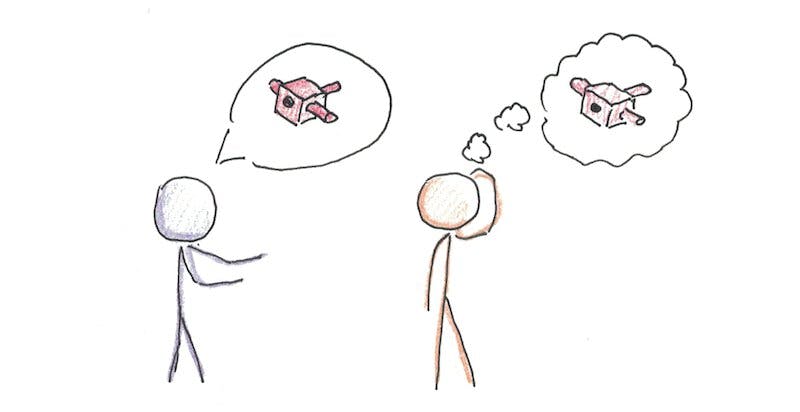
Source: Scott H. Young
Language is the vessel that carried us from the stone age through the agricultural revolution, the development of written language, the scientific and industrial revolutions, and now, the digital age.
Writing allowed us to offload memories to the physical world—outside of our brains. Through our collective and external memories, each generation has a head start on the previous one. Little by little, standing on the shoulders of taller and taller giants, we accumulate knowledge about ourselves and everything around us.
We've been for long using tools to help us think: notebooks help us calculate formulas, reason geometrically and preserve our ideas. With computers, our thinking is now occurring outside of our brains.
Computers are extensions of our minds in that they allow us to store, process, and retrieve information from them. With the advent of the internet we now have immediate access to not only almost all of the information ever produced by humankind but also to reproducible thinking encoded into these machines: algorithms.
Each of these processes—storing, processing and retrieving information—have concrete effects on the physical world: if I'm in Munich, saying "show route to Hamburg" to my phone will immediately show me the distance, ETAs and paths for different types of transport to reach my destination. Not only do I now suddenly know how to navigate across the country to reach another city, I'm also able to follow through the exact path via GPS—a sixth sense giving me perfect geolocation!
These things that we created—computers, and the internet—are literally rewiring our brains, right now, shaping how we think, and engage in social relationships, changing not only our individual selves but the societies we live in.
They started as mechanical machines that filled entire laboratories, turned into beige boxes in our homes and places of work, and are now sleek slabs of plastic, metal and glass in everyone's pockets. Step by step they get closer to our bodies, their interfaces more intuitive and natural.
The way we communicate with them is changing: before, we could only interact with them by speaking their language. We have now taught them ours. The torch of progress blazes on: it's a matter of time until they're connected directly with our brains—which is equally terrifying and awe-inspiring.
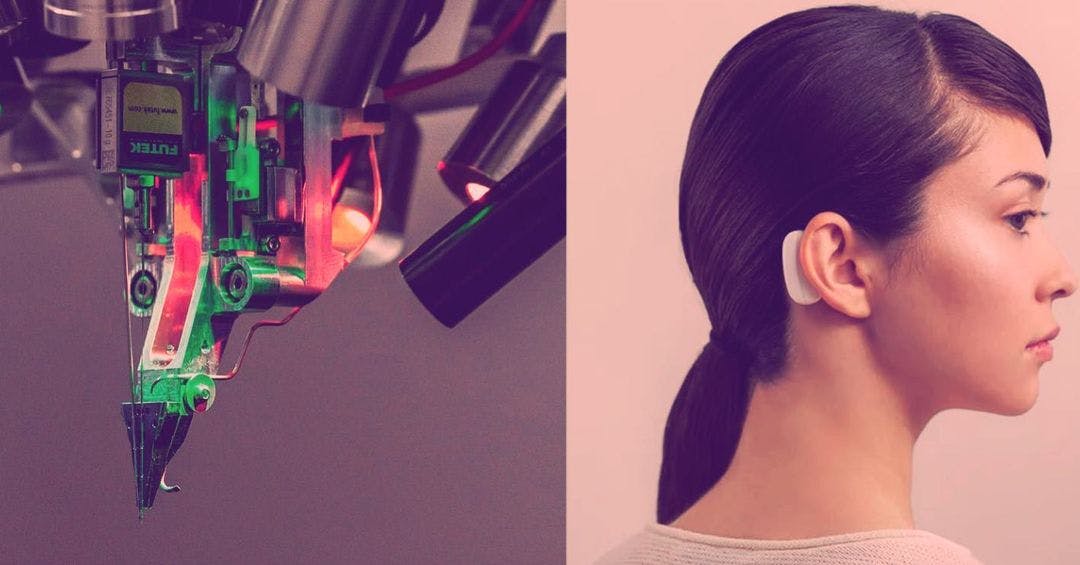
Brain-computer interfaces present a monumental scientific and engineering challenge, and brain-to-brain, a whole other category of difficulty.
First, we have no idea how information is encoded in the brain. That needs to be understood. Second, even assuming we're able to take a perfect snapshot of a piece of information in someone's brain—for example, how a particular movie scene makes them feel—we still need to be able to encode it in a way that includes the full context of their subjective experiences. Maybe the scene evokes unique memories of their childhood or is somehow entangled with the smell of a particular cinema's leather seats. Third, we need to figure out how to safely write this perfect snapshot into someone else's brain in a way that can be perceived identically.
Which is to say, it's a difficult problem. But a worthwhile one: imagine having the capability to suddenly become aware of answers for questions you just thought about. To expertly control truly integrated prosthetics giving you superhuman abilities. To give movement to the paralized, sound to the deaf, and sight to the blind.
What would be the impacts on society if we were able to communicate an order of magnitude more effectively? What if everyone was equipped with the same undisputed basic knowledge of history and science?
There are internal thoughts that we can attempt to describe with a thousand words, but ultimately fail to capture in a way that's precise, much less comprehensible by someone else. Words and sentences are an incomplete representation of our internal thoughts. In the same way that 3D objects cast 2D shadows (and 4D, 3D) communicating through language doesn't carry all of our cultural and developmental context—transmitting all of that along with every phrase would be impractical. Language is in this sense, lossily compressed thought.
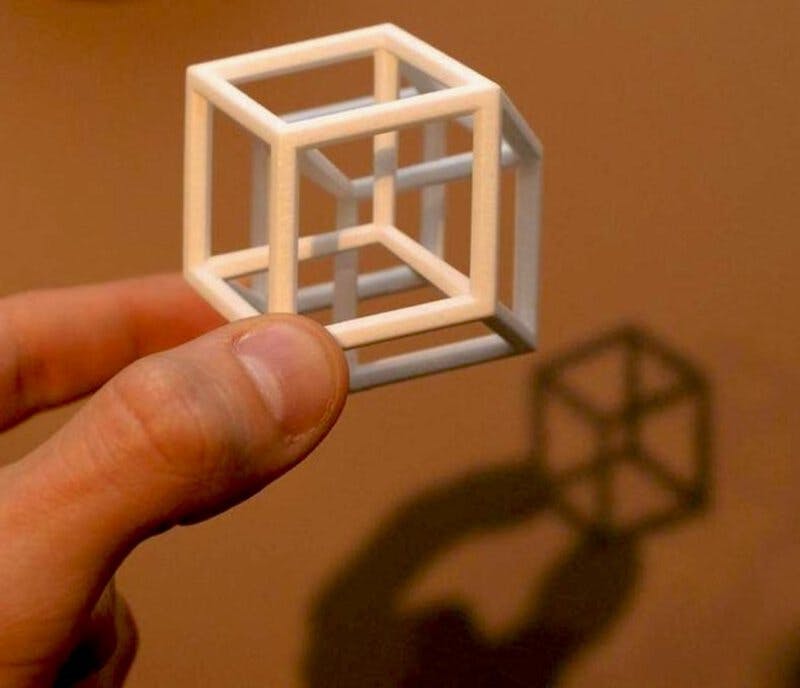
Inert strings of words of ink and paper take a life of their own inside our heads. It's why the exact same information can be interpreted completely differently by different people.
Before language, fire and cooking technology allowed us to reallocate energy usage from the digestive system to the brain by outsourcing digestion to outside of our bodies, making macronutrients more efficiently absorbable. Almost all of a cooked meal is metabolized by the body, whereas raw foods yield less than half of their nutrients.
Cooking is an extension of our digestive system, and enabled us to develop large, calorie-hungry brains. It also gave us time to think: our primate cousins spend half of their days chewing raw food to consume enough calories to stay alive.
Brains can be seen as survival machines, locked inside dark skulls, constantly building a model of the outside world by predicting and learning through senses and memory. The biological human brain evolved to have the necessary sophistication to not only expertly navigate and understand the brute physical reality but also to construct social reality. Democracy, religion, money: all made up by us, for us.
We remember the past so that we can predict the future, and by doing so, we thrive.
We create technology, which functions as a non-biological extra layer to our brains and bodies, augmenting, complementing, and sometimes replacing our natural capabilities.
The wheel… is an extension of the foot.
The book… is an extension of the eye…
Clothing, an extension of the skin…
Electric circuitry, an extension of the central nervous system.
Relatively speaking, we are done evolving biologically. Further adaptations and enhancements to our bodies and minds will come through technology.
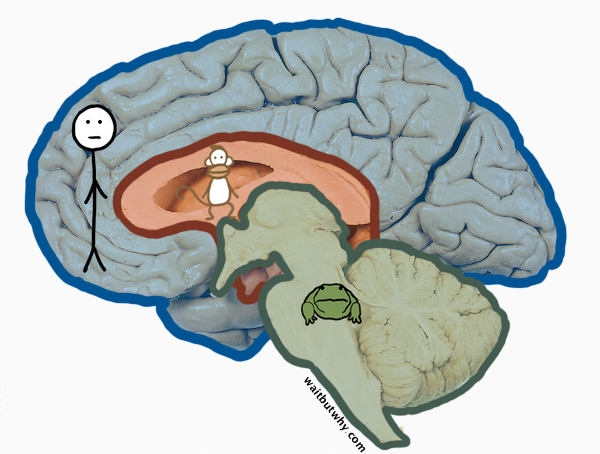
Check out "Neuralink and the Brain's Magical Future" for a very entertaining primer on the brain.
To be human is to have the ability to change the world around us. The shift from hunting and gathering to farming allowed us to spend less energy to acquire food while giving us a predictable calorie supply.
The resulting food surplus made it possible for populations to settle down and grow quickly while supporting people not being directly involved in the production of food—before agriculture that was everyone's job. For one, it allowed some to specialize and focus on developing better farming tools and more resistant crops, starting a vicious cycle of improvement and consumption that continues until today.
The transition from active foraging to a more sedentary lifestyle resulted in worse health for the general population. The average farmer worked harder than the average forager and got a worse diet in return. Our teeth, bones and joints became more fragile, and we became afflicted by novel diseases coming from newly domesticated animals, carriers of pathogens that incubated in our new densely populated cities.
Owning land suddenly became really important. Agriculture and the concept of private property reinforced each other and grew together, allowing us to create value and secure the fruits of our labor. It also created the circumstances for slavery to arise, and wars to be waged.
The groups of people growing the first crops could not have anticipated all of the collateral effects of their breakthrough. They just wanted more food.
If the past has taught us anything is that we have to be mindful of the consequences of our progress. In an increasingly connected world, change is often nonlinear and unpredictable. Cars didn't just replace horses—they forever changed the entire outlook of every city. Did Tim Berners-Lee anticipate his invention adding to forces pulling whole countries apart?
Our progress will continue to bring us previously unimaginable challenges. Against an unknowable future, it doesn't hurt to keep improving our capabilities to adapt and, more difficultly, to cooperate—especially at scale.
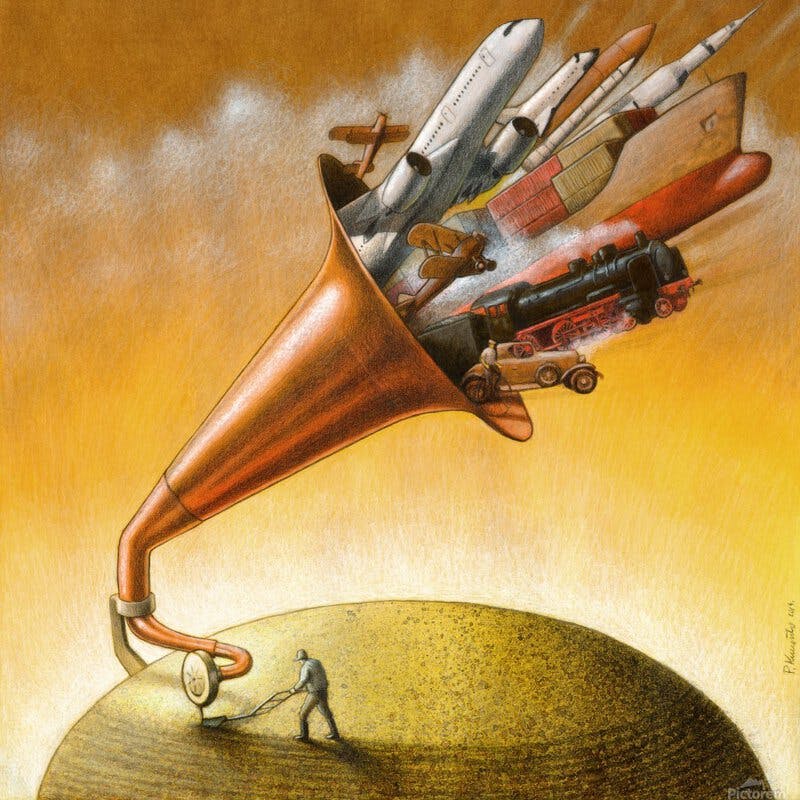
"Humanity" by Pawel Kuczynski
Computers are getting pretty good at driving cars—even in the most difficult situations—and can already instantly diagnose some diseases better than human doctors. Technology has a way to reveal the potential of our environment, and ourselves. We have to be careful not to look at what surrounds us as mere raw materials to be consumed for the purposes we conceive—sooner or later we'll start calling humans resources too...
It serves us well to leverage technology to give us time. Time to create and enjoy art, follow the trail of our curiosities and passions, be fully present with loved ones, or even just appreciate the freedom to idle and ponder about the inconsequential—the stuff that seems to make us, us.
We are born with incomplete brains that get imbued with language and the accumulated collective knowledge of our previous generation. Knowledge, roughly defined as a justified, true belief, doesn't fit the bill of much of the waves of man-made information hitting the shores of our eyes and ears these days. Acquiring it requires many things, and passively consuming content curated by profit-maximizing algorithms is not one of them.
We attempt to transfer our gathered knowledge to machines and we specify the rules for their learning, and by doing that we're inherently encoding our own biases and limitations in algorithms that will be making life-altering choices. Should your out-of-control self-driving car automatically swerve to avoid running over kids on the street, and by doing so put your own life at considerable risk? Should you be able to opt-out of this behavior with a checkbox?
We need to be careful about what we teach machines, and prevent them from making the same mistakes we do, because they will do them orders of magnitude more efficiently and at scale. Human judgment is both fallible and (still) indispensable, especially when the stakes are higher.
To be human is to have the ability to change oneself. Through open source and hardware hacking, people with type 1 diabetes—who need to continuously measure and manipulate their glucose and insulin levels to stay alive—took it upon themselves to build an artificial pancreas and hook it up to their own bodies. The technology they created not only removed an enormous cognitive burden from their lives but also decreased the likelihood of physical complications and increased their lifespans.
What wouldn't you give to free up a large part of your brain processing power and at the same time considerably improve all of your health indicators?
Empowered by knowledge and technology, they didn't have to wait for the world around them to change—they went ahead and changed it themselves. And in the process, they changed their lives.
Arunachalam Muruganantham, who grew up in poverty and dropped out of school at 14 to support his single mother, also didn't wait for the world around him to change. Going against conservative rural India—who treats sex education as taboo—he provided underpriviledged women with affordable sanitary pads by creating a set of pad-producing machines. Poor menstrual hygiene cause women to miss school, risk infections, and die from cervical cancer. The industry around his invention provides women with income, gives them dignity, and saves their lives.
Technology and the tools we create drastically accelerate our progress. Matt Taylor compellingly puts it in perspective in "Humanity 2.0". In it he presents the chart below, which seems to show life's steady and even progress from unicellular organisms to us, human beings, building artificial suns, taking pictures of black holes, and unlocking the mysteries of life itself.
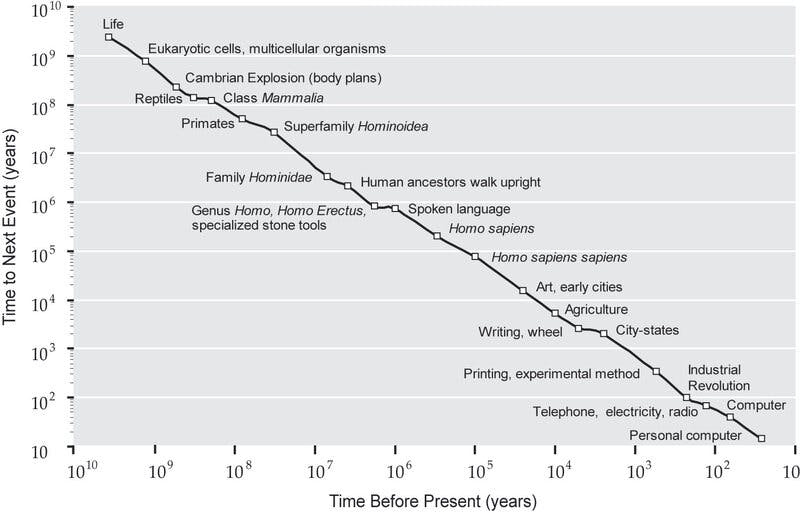
From The Singularity Is Near by Ray Kurzweil
The scale of this chart could be initially misleading: the visual distance between the birth of life and the first eukaryotic cells—2 billion years—is represented identically as the distance between the industrial revolution and the personal computer—200 years.
The chart below tells the same story on a scale more easily digestible by us.
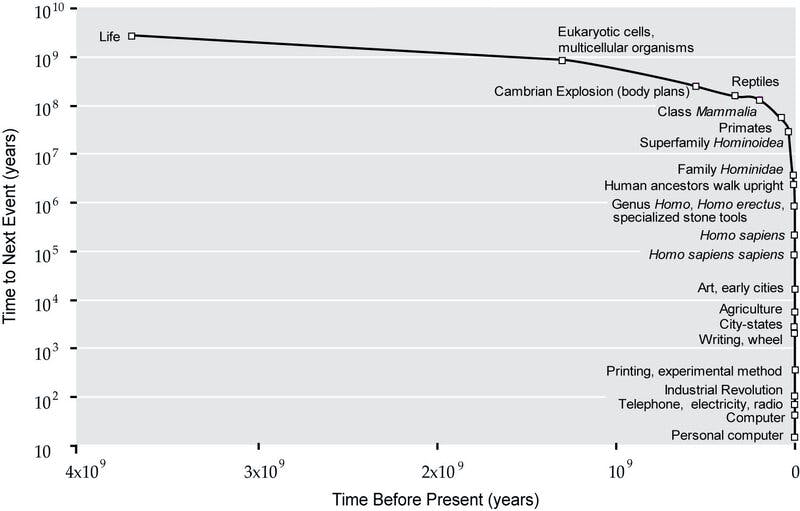
From The Singularity Is Near by Ray Kurzweil
The mostly horizontal line depicts the slow process of biological evolution, which eventually—out of only randomness and constraints—brought our neomammalian brains into existence, kick-starting the journey of fire and language towards modern civilization. It's been a long ride, and in the relative time scale of biology our evolution through technology is happening fast and only seems to be accelerating.
Each technological advance builds upon the last, creating a positive feedback loop of progress.
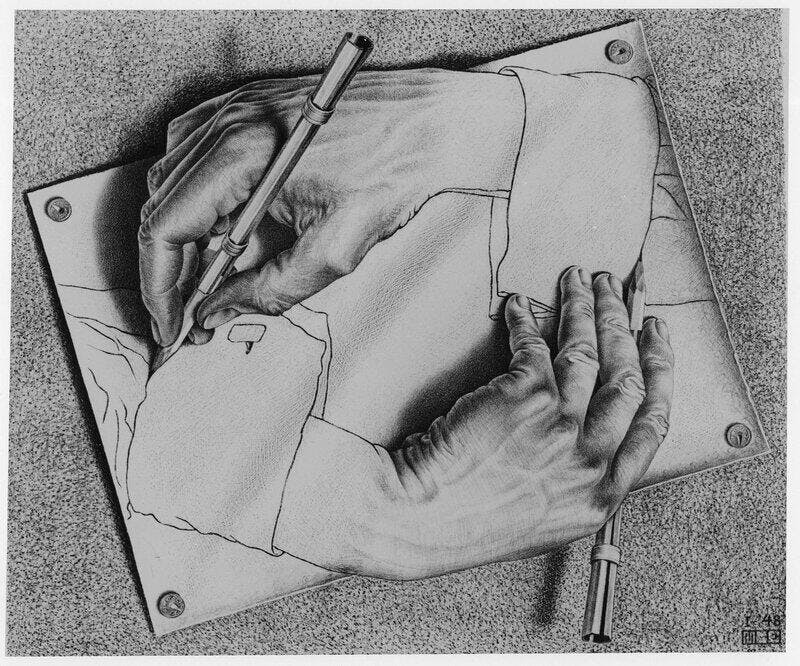
We shape our tools, and then our tools shape us.
— Marshall McLuhan
We are inevitably shaped by what we create, and fundamentally driven by our deeply human essence: the anticipation of discovery, the satisfaction of attainment, and the joy in relationships we cultivate along the way.
The technology we create will survive us, and its impact will be unevenly felt—the fruits of progress aren't unconditionally good. We've come a long way towards improving our lives, and we can still go so much further. There are so many problems to solve.
In these unprecedented times of tremendous individual potential, it's good to keep our values in check and constantly revisit the question: are we building the right things?
History is a metaphorical pathway, and just like physical ones, it's built purposefully by us, based on the topography and constraints of the environment. Unlike physical ones, it sometimes takes us by surprise.
The future is still not determined, and "the best way to predict it is to invent it". Informed by our knowledge and empowered by our technology, it is up to us to lay the bricks.
This article is part of How to open a file in Emacs: A short story about Lisp, technology, and human progress, published in January 03, 2021.